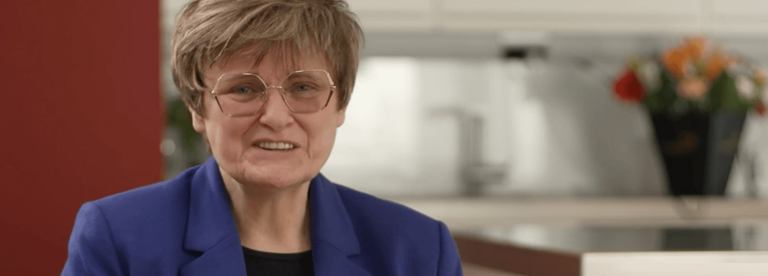- Her research work on modified mRNA paved the way to highly effective vaccines against COVID-19
- Despite recurring adverse circumstances over many years, she remained undeterred and stuck to her idea
Munich, 21 June 2022 - The European Patent Office (EPO) today honoured Hungarian-American researcher Katalin Karikó with the European Inventor Award 2022 in the category "Lifetime achievement", for her seminal work in developing modified messenger RNA (mRNA) for vaccines and medical therapies.
For more than four decades, Karikó has championed the therapeutic potential of mRNA, overcoming both scepticism and countless challenges in her quest to unlock its effective use for humans. Her work not only paved the way for the most successful mRNA-based COVID-19 vaccines but also opens the door to new therapies for many other diseases and conditions.
"With her vision that significant medical benefit could be achieved with the mRNA molecule, Katalin Karikó has generated an impact that goes far beyond the now well-documented medical success", says António Campinos, President of the European Patent Office. "Her dedication to science and perseverance together with the innovative quality of her research have gifted the world with a breakthrough innovation that holds potential for new perspectives in the fight against some of the worst medical threats to mankind around the globe."
Karikó was honoured at the European Inventor Award 2022 ceremony, a hybrid event watched online by a worldwide audience. The Award is one of Europe's most prestigious innovation prizes and is presented annually to outstanding inventors from Europe and beyond who have made an exceptional contribution to society, technological progress and economic growth.
Humble beginnings
Karikó's research career is marked by her dedication to exploiting the medical potential offered by the mRNA molecule. Born in a small town in rural Hungary, her early interest in biology and thirst for knowledge led her to pass competitive entry exams for the University of Szeged, where she joined the cutting-edge Biological Research Centre (BRC) of Hungarian Academy of Sciences. In 1985 she and her husband left Hungary for the US to take up a position at Temple University in Philadelphia. There she spent three years trying to use double-stranded RNA to treat HIV patients. She then took another offer in Bethesda, Maryland, where she read extensively about emerging work on mRNA, a molecule that carries instructions for building proteins from a cell's DNA to its molecular building machines.
Spotting the potential of mRNA
Since 1990, scientists had known that injecting synthetic mRNA into a body could result in the production of specific proteins on demand. Soon Karikó became acutely aware of the medical potential of mRNA:
"I immediately imagined mRNA could be beneficial and I was thinking of something very simple, like wound healing," she says. "So, I started to make a different RNA coding for the production of a protein which had already been found to accelerate wound healing and later also close without a scar."
When she was offered a position at the University of Pennsylvania (UPenn) in 1989, she directed her research focus on the molecule. As an unstable compound, however, mRNA is difficult to work with, and the cost of development saw it fall out of favour in the scientific community in the 1990s. Karikó couldn't get funding for her mRNA work and was demoted from the faculty position. She chose to stay as a senior researcher - a decision that would pay off: In 1997, she found an ally in a new immunologist colleague, Drew Weissman. Together they worked on a therapeutic mRNA-based HIV vaccine using a nucleoside-modified mRNA molecule they had created.
This marked the turning point: With further work to purify the mRNA, Karikó and Weissman managed to unlock a broad range of scenarios in which the molecule could feasibly be used in disease treatment and vaccination. They filed the seminal patents for their work in 2005, which paved the way to commercialisation of the modified mRNA through a company RNARx, which Karikó and Weissman set up in 2006. The University of Pennsylvania, however, sold the licences to a different company: "Without the patent, we were not a real company," says Karikó. "But I decided at that point that I am not done."
Tackling COVID-19
The medical breakthrough came when Karikó joined BioNTech in Germany, which had a clinical trial with mRNA and were persuaded by her to adopt nucleoside-modified mRNA. She landed a contract with Sanofi to develop modified mRNA to be injected directly into tumours to promote cancer-specific immune responses, and was working on an mRNA-based flu vaccine with Pfizer when first news of COVID-19 broke in late 2019.
BioNTech quickly pivoted from flu to COVID-19 by tweaking the vaccine to match the genetic sequence of the novel coronavirus - and rapidly advanced to testing and deployment with Pfizer. Another, nucleoside-modified mRNA-based COVID-19 vaccine from US company Moderna, approved for use around the same time, was also based on Karikó and Weissman's technology.
A field with growing potential
Beyond COVID-19, Karikó's research has paved the way to a wide range of medical treatments based on modified mRNA. Efforts are underway to develop therapeutic vaccines for different types of cancer, as well as treatments for cardiovascular diseases and metabolic disorders. The scientist herself has a list of around 30 modified-mRNA-based therapies she would like to develop - a fitting outlook for a career built on pushing on no matter what happens: "You have to learn to take the negative stress, convert it to positive stress and that was my attitude," she says. "It didn't matter what the people were saying. If it was constructive, I would listen and the rest of it, I absolutely ignored... With that kind of attitude, you can make it."
Notes to the editor
About the inventor
Katalin Karikó was born in Hungary in 1955. She was awarded a degree in biology from the University of Szeged in 1978 and a PhD in biochemistry from the same university in 1982. After working as a post-doc at the Biological Research Centre in Szeged she moved to the US in 1985, working first at Temple University Philadelphia and then the Uniformed Services University of the Health Sciences in Maryland. In 1989 she took a position at the University of Pennsylvania School of Medicine to research mRNA. Based on this work, Karikó co-founded RNARx in 2006 with Drew Weissman. In 2013 she moved to Germany to take up a position with BioNTech AG, where she is currently Senior Vice President. Previous awards include the Breakthrough Prize in Life Sciences, Time Hero of the Year 2021, the Lasker Award, the Princess of Asturias Award and the Japan Prize, all of which she shared with Weissman, as well as the 2022 Vilcek Prize for Excellence in Biotechnology.
Karikó is named inventor in European patents EP2578685B1 (granted 2019), EP3287525B1 (granted 2019), EP3112467B1 (granted 2018) and EP2510099B1 (granted 2017).
About the European Inventor Award
The European Inventor Award is one of Europe's most prestigious innovation prizes. Launched by the EPO in 2006, the award honours individuals and teams' solutions to some of the biggest challenges of our times. The finalists and winners are selected by an independent jury comprising former Award finalists. Together, they examine the proposals for their contribution towards technical progress, social and sustainable development and economic prosperity. The EPO confers the Award in five categories (Industry, Research, SMEs, Non-EPO countries and Lifetime achievement). In addition, the public selects the Popular Prize winner from the 13 finalists by voting on the EPO website in the run-up to the ceremony.
This year, for the first time, the EPO is also awarding bright young minds with the Young Inventors prize. The new prize offers a monetary reward to the three finalists to further encourage them to find creative solutions to pressing sustainable development challenges.
About the EPO
With 6 400 staff, the European Patent Office (EPO) is one of the largest public service institutions in Europe. Headquartered in Munich with offices in Berlin, Brussels, The Hague and Vienna, the EPO was founded with the aim of strengthening co-operation on patents in Europe. Through the EPO's centralised patent granting procedure, inventors are able to obtain high-quality patent protection in up to 44 countries, covering a market of some 700 million people. The EPO is also the world's leading authority in patent information and patent searching.
This is an original press release from the European Patent Office dated 06/21/2022.
Header: Europäisches Patentamt


